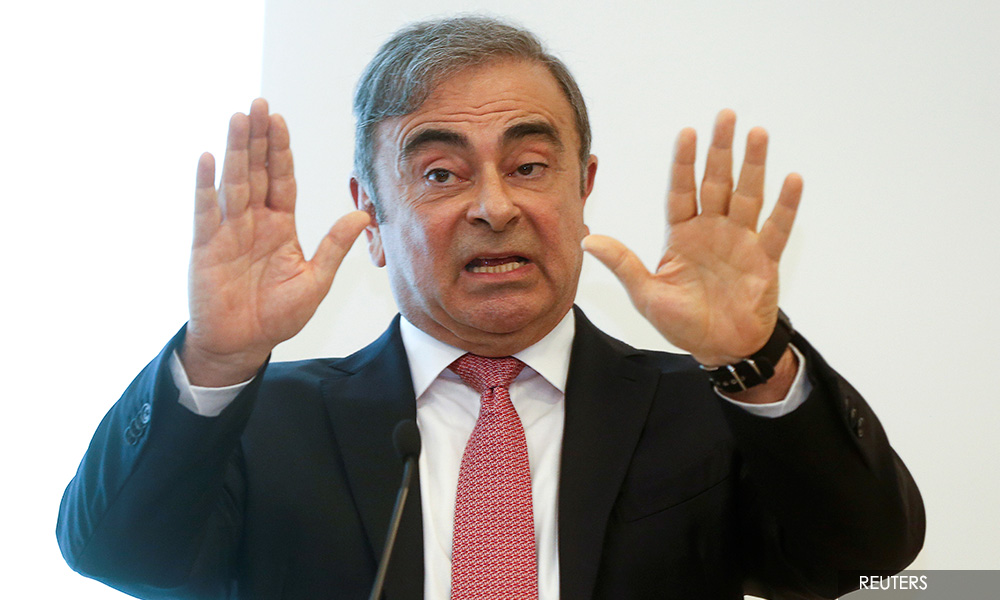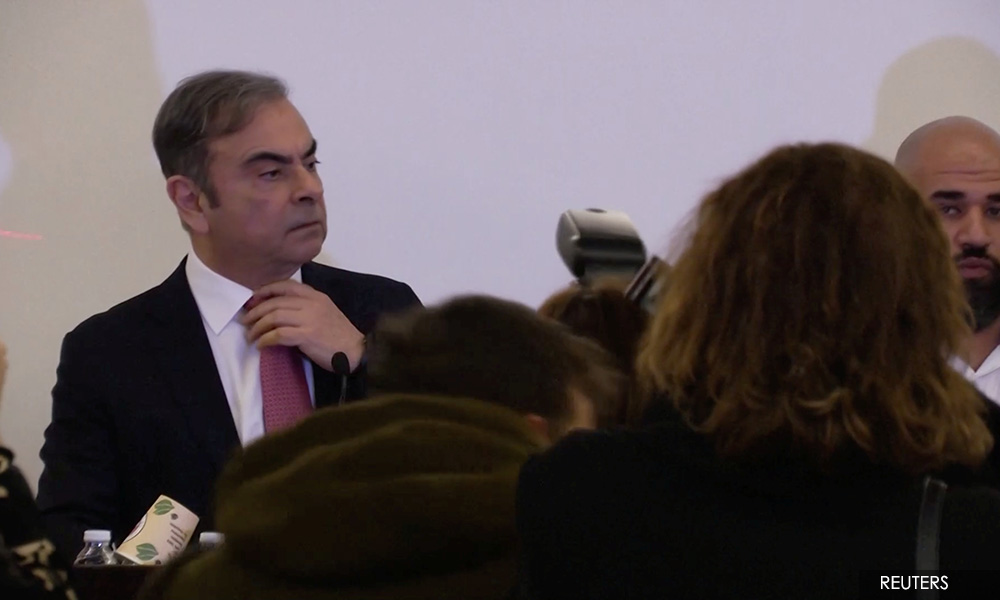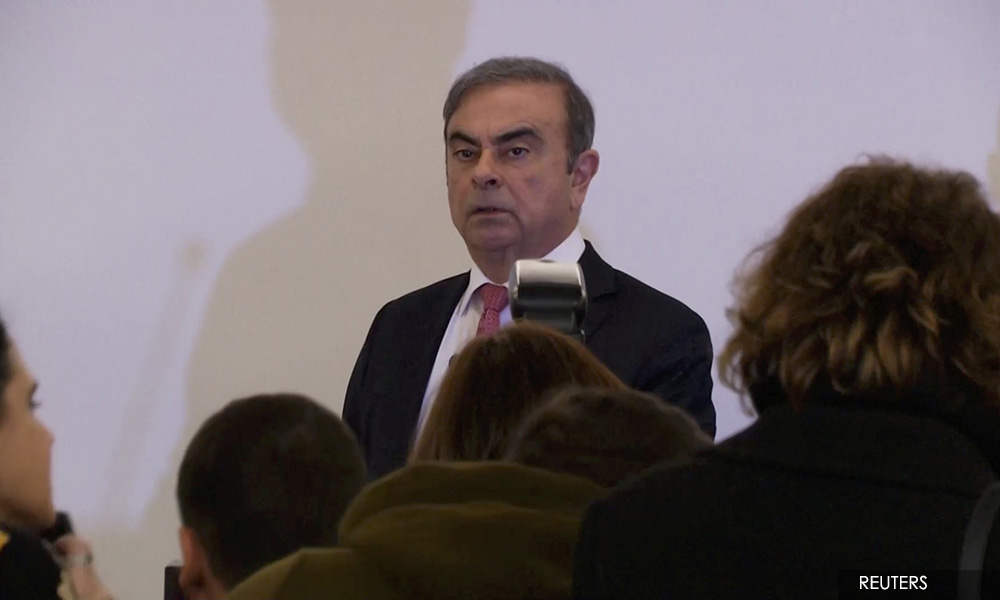Carlos Ghosn, speaking publicly for the first time since his dramatic escape from Japanese justice, said on Wednesday he had been treated “brutally” by Tokyo prosecutors and was the victim of an inside job to oust him from the helm of automaker Nissan.
The one-time titan of the car industry said in a two-hour news conference in Beirut that he had no choice but to flee. The alternative was to spend the rest of his life languishing in Japan without a fair trial.
Ghosn, 65, fled Japan last month as he was awaiting trial on charges of under-reporting earnings, breach of trust and misappropriation of company funds, all of which he denies.
“I felt like the hostage of a country I served for 17 years,” he told reporters.
In a combative performance, he gave a point-by-point rebuttal of the charges which he said he had been prevented from doing before, and compared the surprise of his arrest with Japan’s preemptive strike on Pearl Harbour during World War Two.

Ghosn said he had escaped to his childhood home of Lebanon to clear his name and declined to say how he fled, noting there were conflicting stories about his astonishing escape.
“The charges against me are baseless,” Ghosn said, and he repeated his allegation that Nissan and Japanese authorities colluded to oust him following a downturn in Nissan’s fortunes and in revenge for French government interference in the carmaker’s alliance with Renault.
Tokyo prosecutors said his allegations of a conspiracy were false and that he had failed to justify his acts.
“Defendant Ghosn’s allegations completely ignore his own conduct and his one-sided criticism of the Japanese criminal justice system is totally unacceptable,” the Tokyo prosecutor’s office said after Ghosn spoke.
The 14-month saga has shaken the global auto industry, jeopardised the Renault-Nissan alliance of which Ghosn was the mastermind and increased scrutiny of Japan’s judicial system.
Ghosn said he had no intention of merging Renault with Nissan as some in Japan feared, but wanted to put the firms under a holding company that would have maintained a balance between the French carmaker’s push for a union and the Japanese company’s desire to remain autonomous.
He named Masakazu Toyoda, an independent director at Nissan and a special adviser to the Japanese cabinet; Nissan’s ex-auditor Hidetoshi Imazu; and the car company’s former executive vice president Hitoshi Kawaguchi as the main architects of his downfall.
Imazu, Kawaguchi and officials at Nissan could not immediately be reached for comment.
“First, if he (Ghosn) has anything to say, he should do that openly in court before he leaves Japan illegally. A conspiracy story without any evidence sounds like a joke,” one person referred to by Ghosn told Reuters.
Ghosn declined to name Japanese government officials he said took part in the alleged plot because he said he did not want to embarrass the Lebanese government, but added he did not think the top level of the Japanese government was involved.
Lost way
Ghosn covered many subjects, talking about his Marie Antoinette-themed party at the Palace of Versailles in France and describing harsh confinement in Tokyo’s main jail.
“I was brutally taken from my work as I knew it, ripped from my family and my friends...It is impossible to express the depth of that deprivation,” he said.
“I was interrogated for up to eight hours a day without any lawyers present...’It will get worse for you if you don’t just confess,’ the prosecutor told me repeatedly.”

Ghosn became most animated in describing how he thought the Nissan-Renault alliance had lost its way since his departure, saying it had fallen behind in investment in technology, profitability and market value and failed to seize opportunities such as a potential tie-up with Fiat-Chrysler.
“How do you miss that? It’s unbelievable,” he said.
Nissan has said an internal investigation found that Ghosn had engaged in personal use of company money and had under-reported his income in violation of Japanese law.
Japan’s Ministry of Justice has said it will try to find a way to bring Ghosn back from Lebanon, even though it has no extradition treaty with Japan.
“I didn’t escape because I was guilty, I escaped because I had zero chance for a free trial,” he said, adding that he was prepared to stand trial in any of his three home countries, Lebanon, France or Brazil, none of which have extradition agreements with Japan.
When asked if he had been given any assurances from Lebanese officials about not being extradited, he said: “I am confident that the existing practices and laws will be respected in Lebanon and this is what I heard from all the officials here.”
Lebanon’s state news agency said a public prosecutor had summoned Ghosn for questioning on Thursday.
New warrant
Ghosn said the Japanese authorities were intent on preventing him having his say.
“Why have they spent 14 months trying to break my spirit, barring any contact with my wife?” he said.

Tokyo prosecutors issued an arrest warrant for Ghosn’s wife, Carole, on Tuesday for alleged perjury related to the misappropriation charge against her husband.
Turkish and Japanese authorities are investigating how Ghosn was smuggled out to Beirut. Interpol has issued a “red notice” seeking his arrest.
“This (escape) was the most difficult decision of my life but I was facing a system where the conviction rate is 99.4 pct and I believe the number is far higher for foreigners,” he said.
“When I saw I was free it was as if I was born again.”
- Reuters

